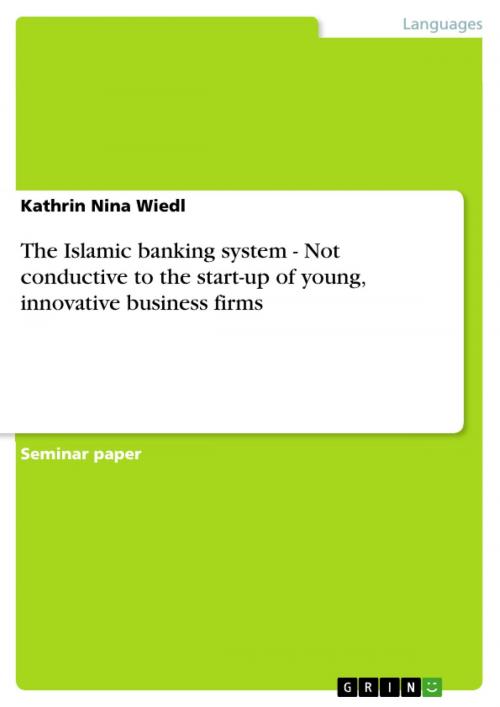The Islamic banking system - Not conductive to the start-up of young, innovative business firms
Not conductive to the start-up of young, innovative business firms
Nonfiction, Religion & Spirituality, Middle East Religions, Islam| Author: | Kathrin Nina Wiedl | ISBN: | 9783638470124 |
| Publisher: | GRIN Publishing | Publication: | February 15, 2006 |
| Imprint: | GRIN Publishing | Language: | English |
| Author: | Kathrin Nina Wiedl |
| ISBN: | 9783638470124 |
| Publisher: | GRIN Publishing |
| Publication: | February 15, 2006 |
| Imprint: | GRIN Publishing |
| Language: | English |
Seminar paper from the year 2006 in the subject Orientalism / Sinology - Islamic Studies, grade: 1,3, Ben Gurion University (Middle East Institute), course: Middle East Economics, 81 entries in the bibliography, language: English, abstract: The Islamic banking system is a relatively young institution that gains influence not only in the Islamic world but also in non-Muslim countries with big Muslim communities. The first Islamic bank, Dubai Islamic Bank, was erected in 1975; today about 265 Islamic finance institutions operate in more than 70 countries, and their assets have increased more than 40-fold since 1982 to exceed $230 billion. More and more western banks erect Islamic branches; the first was Citibank in 1996. This paper discusses the influence of an Islamic banking system on the start-up of young, innovative businesses. A negative influence would hinder these businesses to develop - if not counterbalanced by other measures like state involvement. In non-Muslim countries it would constrain religious Muslims from participating in the contemporary economical changes, determined by an opening-up of markets and privatization, which requires the start-up of new businesses. The Islamic banking system operates according to Islamic law; hence several Islamic restrictions, the most important is the prohibition of riba (=interest), limit its freedom to develop suitable financing instruments for the support of young, innovative businesses. These restrictions enlarge the risk of the bank especially when financing these businesses, so the bank either avoids these businesses or tries to bend the Islamic law and operates - de facto - like a conventional bank. In this case, however, the bank is facing problems with the Religious Supervisory Board, an integral part of every Islamic bank, which will stop the bank from deriving from the Islamic law (shar?´a). After discussing these determinants, I will discuss the existing interest-free financing instruments of Islamic Banking suitable for the start-up of young, innovative enterprises. On the example of the PLS-concepts musharaka and mudaraba, I will analyse the factors that make these financing concepts not attractive for banks, especially when financing young, innovative business. On the example of the Mark-up activities murabaha (Trade Financing) and ijara/ijara al-waktina (Leasing) I will analyse, why these concepts are only suitable for financing very special cases of young businesses and are not a suitable alternative to Western banking concepts for the majority of young entrepreneurs. Finally I will show ideas how to improve the system without violating Islamic law, but also discuss the limits of the Islamic banking system.
Seminar paper from the year 2006 in the subject Orientalism / Sinology - Islamic Studies, grade: 1,3, Ben Gurion University (Middle East Institute), course: Middle East Economics, 81 entries in the bibliography, language: English, abstract: The Islamic banking system is a relatively young institution that gains influence not only in the Islamic world but also in non-Muslim countries with big Muslim communities. The first Islamic bank, Dubai Islamic Bank, was erected in 1975; today about 265 Islamic finance institutions operate in more than 70 countries, and their assets have increased more than 40-fold since 1982 to exceed $230 billion. More and more western banks erect Islamic branches; the first was Citibank in 1996. This paper discusses the influence of an Islamic banking system on the start-up of young, innovative businesses. A negative influence would hinder these businesses to develop - if not counterbalanced by other measures like state involvement. In non-Muslim countries it would constrain religious Muslims from participating in the contemporary economical changes, determined by an opening-up of markets and privatization, which requires the start-up of new businesses. The Islamic banking system operates according to Islamic law; hence several Islamic restrictions, the most important is the prohibition of riba (=interest), limit its freedom to develop suitable financing instruments for the support of young, innovative businesses. These restrictions enlarge the risk of the bank especially when financing these businesses, so the bank either avoids these businesses or tries to bend the Islamic law and operates - de facto - like a conventional bank. In this case, however, the bank is facing problems with the Religious Supervisory Board, an integral part of every Islamic bank, which will stop the bank from deriving from the Islamic law (shar?´a). After discussing these determinants, I will discuss the existing interest-free financing instruments of Islamic Banking suitable for the start-up of young, innovative enterprises. On the example of the PLS-concepts musharaka and mudaraba, I will analyse the factors that make these financing concepts not attractive for banks, especially when financing young, innovative business. On the example of the Mark-up activities murabaha (Trade Financing) and ijara/ijara al-waktina (Leasing) I will analyse, why these concepts are only suitable for financing very special cases of young businesses and are not a suitable alternative to Western banking concepts for the majority of young entrepreneurs. Finally I will show ideas how to improve the system without violating Islamic law, but also discuss the limits of the Islamic banking system.















